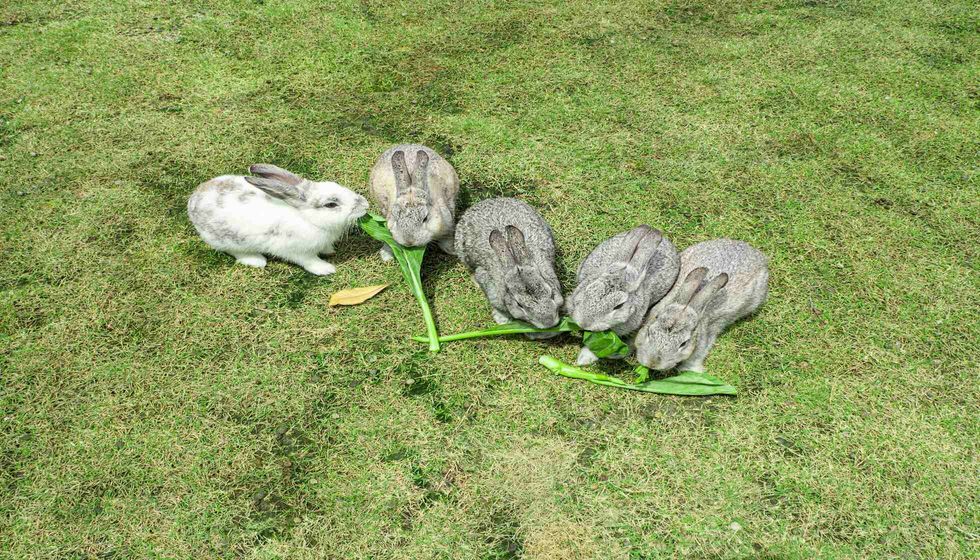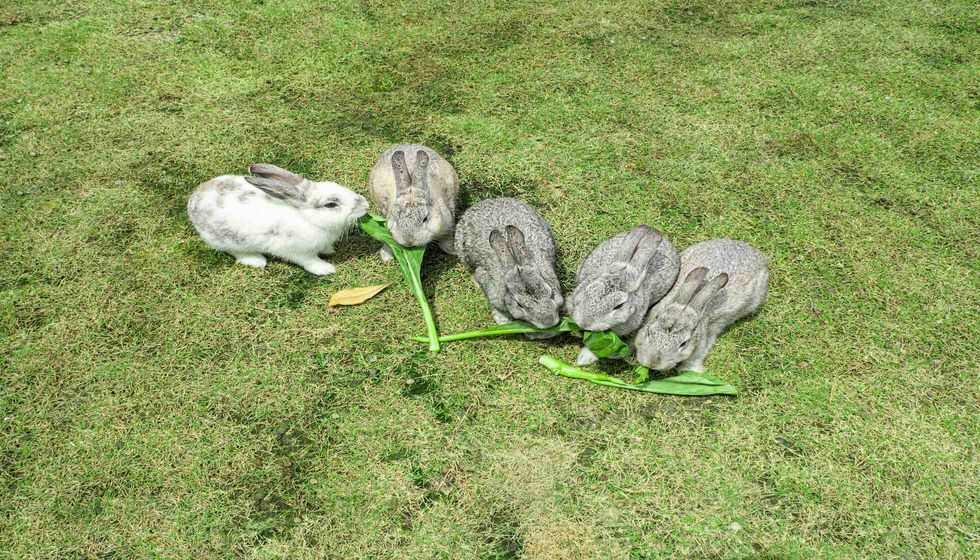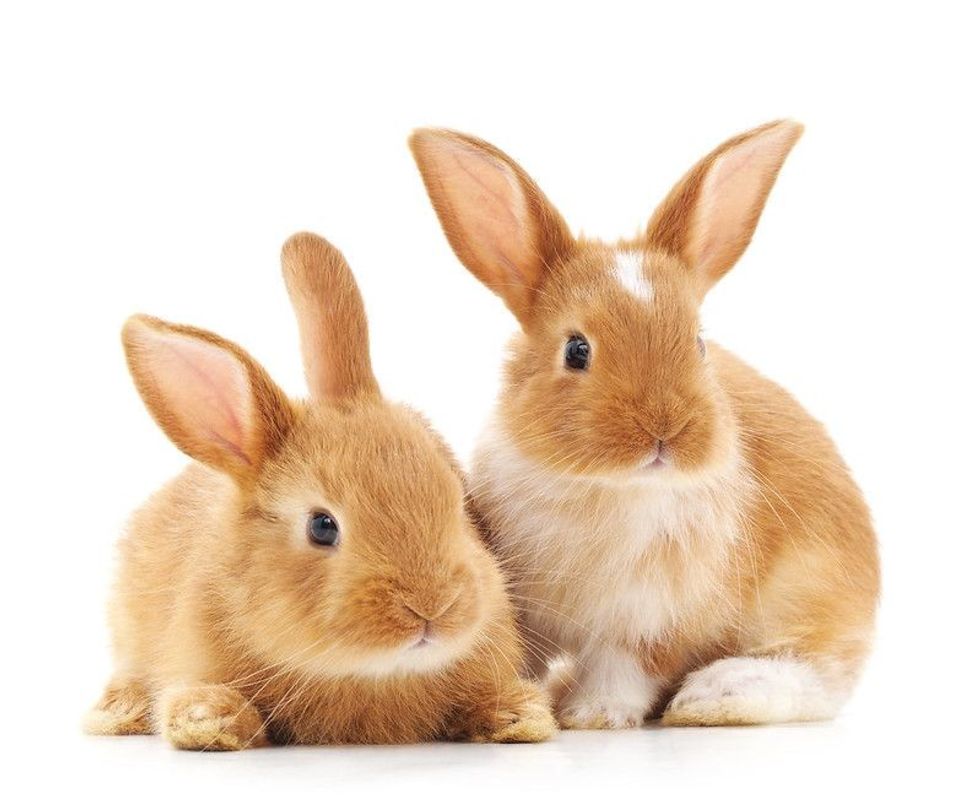A fuzzy pet with fur and a shade of whimsical pink, a rabbit, always melts our hearts.
Rabbits are found almost everywhere globally, from the Indian Subcontinent and Japan to Africa and parts of Europe. However, the origin of domesticated rabbits comes from European countries.
A female rabbit is named a doe, whereas male rabbits are known as bucks, and baby rabbits are known as kittens. Yes!
Baby rabbits are often called kittens (kits being the short form) and not bunnies!
A baby rabbit is known to be one of our favorite pets. Let's find out more about these baby rabbits, like what the litter size is, what is the gestation period of female rabbits, how to take care of these cute pets after their mother has given birth, and much more in this article.
If you love to read about rabbits, babies of rabbits, and more interesting facts, then why don't you take a look at our how to potty train a rabbit? And can rabbits have celery?
How do I know if my rabbit's pregnant?
Many people have a lot of questions when it comes to rabbits. There are various myths and rumors about these fuzzy little creatures with fur that it's hard to know what to believe.
Pregnant rabbits are generally considered to be excellent mothers, taking good care of their litter. If they are pregnant, they will give birth to their babies around 30 days or within one month.
The time for giving birth can vary slightly, depending on the rabbit's breed. After the rabbit is pregnant, she will need to be given proper nutrition to make sure that she is healthy and that the baby bunnies are healthy, too.
A rabbit is a mammal just like us humans from the animal kingdom. If the rabbit is not neutered, it is called intact.
Once these intact rabbits reach sexual maturity, males and females mate. Female rabbits become pregnant giving birth to babies.
Sexual maturity is reached during different periods for various rabbits. For example, if it is a bunny of a smaller breed, its sexual maturity may be achieved within 3.5 months. You should start monitoring your female rabbits if they are of smaller size and are intact and make vet visits for your pet more frequently.
There are four stages of rabbit pregnancy. A rabbit is a mammal, like us.
A pregnant rabbit will show primary symptoms of bloated belly and mood swings throughout the first stage of rabbit pregnancy. A pregnant rabbit may start acting more cranky in the first stage of rabbit pregnancy until she gives birth to babies.
Some other symptoms of a pregnant rabbit might include eating more and gaining weight. Once a female rabbit is bred, after 10-12 days, in the second stage, you will be able to feel tiny marble-shaped babies in the belly of the pregnant rabbit. These babies will grow larger within two weeks.
In the third stage, around a week before going into labor, the rabbit will start nesting and fur pulling. At this time, it is imperative to keep vet visits frequent during this period.
After around one month, in the fourth stage, the pregnant rabbit will give birth to the babies. If the rabbit does not give birth even after 33 days, you must contact your vet.
How long before rabbits give birth do they make a nest?
Rabbit pregnancy or gestation period of a rabbit is 28-32 days after the male and female mate. The average rabbit litter size is 4-6 babies.
There are a couple of factors that determine the size of a rabbit litter. One of the most vital factors is the health of the female rabbit during her pregnancy.
If she is stressed, malnourished, or ill, her body will divert nutrients from the embryos to keep her alive. The age of the pregnant female rabbit is also a factor. If she is an older rabbit, she will have a more challenging time getting pregnant and giving birth to fewer babies.
The weight of the pregnant female rabbit is a factor as well. Overweight rabbits are more likely to give birth to larger litters.
After a male and female rabbit breed, the female starts showing symptoms of rabbit pregnancy after 10-12 days.
But the mother rabbit starts nesting for her babies a week before the night she is ready to undergo labor, thus her babies are born. When a pregnant rabbit starts nesting, she begins building a nesting box for hours every day in the last week of the four weeks of the rabbit's pregnancy.
To know if your rabbit's nesting, you can check for signs.
When the mother rabbit builds a nest, she will start piling up hay in her nest or cage to create comfortable bedding so that she can have a nice place to go into labor.
One more thing about a mother rabbit is that she will start pulling her fur out to line the nest along with the hay that she uses. This is normal for pregnant rabbits who build a nest, yet is astonishing for many pet rabbit owners.
Once the mother rabbit pulls her fur off her body, you should expect her to go into labor either within hours or after one or two days, typically at night.
False Rabbit Pregnancies

Have you heard about fake rabbit pregnancy? A rabbit is sometimes convinced about her pregnancy even when she is not pregnant.
False pregnancy is usually called pseudo rabbit pregnancy or phantom pregnancy. The condition is responsible for a great deal of suffering among rabbit breeders and pet owners.
It happens when a doe is not bred or has never been bred at all.
She develops a maternal attitude and displays the same signs of rabbit pregnancy as a doe who has been mated and is carrying a litter. In the case of a doe who is not mated, it is impossible for her to be pregnant.
In the case of a doe who has been mated, the signs of rabbit pregnancy in unmated rabbits are not as pronounced as those who have been mated, but she still shows many signs. False pregnancies are most common in young and novice does and can be distressing for owners.
In false pregnancy, a rabbit does not have a litter and does not even mate but behaves as if she does. In a real pregnancy, many changes occur in the body of the doe, not the least of which is the presence of kits (baby bunnies) inside her body.
During a false pregnancy, the doe will become highly protective of an empty nest box and may experience some of the following symptoms: she will be more affectionate and may want to spend more time with people.
She will become more protective of her territory and of her human family. She will become more territorial and protective of her nest box.
She will be more aggressive and territorial and may attack other rabbits and people. She will act more dog-like in her behavior, wagging her tail and rolling on her back to show her belly.
She may chew on objects and might seem to be making a nest.
She might spend a lot of time lying down and groaning. She may also nurse stuffed animals and other items, as well as nursing injuries, i.e., licking an area of her body as if she is nursing a kit.
Care Of Baby Rabbits
After the mother rabbit has given birth to baby rabbits, they emerge from the nest at around 3-4 weeks of age. Their eyes start to open for about three weeks of age as well. After that, the curious little creatures are ready to explore the world and discover what's going on around them.
It's vital that you are cautious with their diet since they can be quite sensitive to a significant change in their diet and to new foods, similar to human babies.
So it's essential that they've got lots and lots of hay to feed on.
They should be fed up to 80% of their diet with hay. You will also need to consider a small dry mix of food, and this should be small brown pellet food and one that is made for rabbit babies.
Only a small handful of this should be fed once a day, and then they can be free to slowly graze on certain types of grasses and small selections of wild plants such as blackberry and strawberry leaves which will be fine for their digestive system.
Rabbits will need their first vaccination, which is their Myxomatosis, from six weeks of age.
They will need to have their VHD vaccination starting from three months of age. You should keep up to date with these vaccinations as rabbits are vulnerable to these diseases, particularly at any age, and babies can be particularly prone to it as well.
When you are first handling rabbits, it's a good idea to make sure that you run your hands in some of the bedding material that mother rabbit has made so that you have their mother's smell on your hands and you are not introducing them to any scary smells of the environment.
The best way to make rabbits feel good and safe with you is to let them have small bites of food from your hand and hop on and off your lap. Do not try to chase them and keep picking them up.
It will induce stress in them, and they'll be scared.
They will eventually grow into rabbits who will kick, scratch, bite and even growl at you. So let the rabbits feel safe and come up to you themselves.
Letting the rabbit run for about an hour and a half every day will help your rabbit be a relaxed and calm rabbit, and they'll be really quite happy to be handled and socialized.
Here at Kidadl, we have creatively and carefully created lots of interesting family-friendly facts for everyone to enjoy! If you liked our suggestions for how long are rabbits pregnant? Then why not take a look at what to do when your dog is pregnant for the first time? Or How many babies do mice have?










